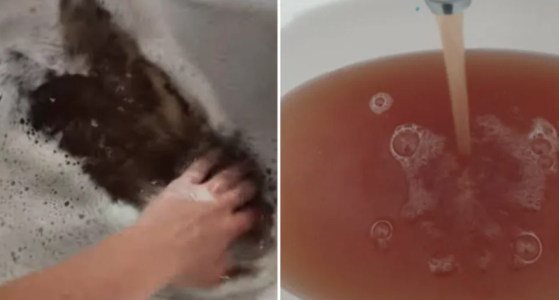This is the unexpected side effect of Aussie bushfire season
By
VanessaC
- Replies 2
With bushfires wreaking havoc down the East coast of Australia, causing widespread evacuations and endangering hundreds of homes, there's already plenty to be anxious about.
Tragically, on top of the very real threat of evacuation, property damage, and loss of life, now comes yet another concern for residents of these affected areas: the peculiar 'black' drinking water coming out of their taps.
Residents in the fire-devastated region of Mackay, located in the north of Queensland, have reported unsettling 'brown and black' water gushing from their taps this week, leading to serious health worries and reluctance to use it.
As it turns out, the discolouration resulted from an intense surge of water that stripped decades-old piping of manganese that was lodged inside the pipes.
Consequently, authorities have been compelled to 'scrub and flush clean' vast distances of pipelines to mitigate the situation, as ‘scorching conditions’ are expected to persist into the weekend.
Associate Professor Ian Wright of the University of Western Sydney, who has two decades' worth of experience at Sydney Water, shared that this was the first such event he'd encountered.
'This is really, really unusual because this is actually from firefighting putting huge stress on, and basically sending huge volumes of water through the pipes—it's actually dislodged metals from within them,' the professor said.
'It wasn't what I expected at all, but it does just goes to show that extreme weather and firefighting can cause so many different types of problems. This is one I've actually never heard of, and I've been in the water industry a long time.'
Records of brown water flowing from taps aren't new and are typically linked to 'burning and ash getting into the water system', according to Professor Wright.
However, as fires continue to spread along the coast, he said that it is not unlikely that a similar scenario could occur in other parts of the country—even in NSW.
'You know, like a lot of cities, we have some very, very old pipes—and old doesn't mean bad—but some old pipes can form what they call biofilm,' he said.
'Biofilm is like a layer inside tiny little microorganisms, or some kind of corrosion, sometimes even some sediment can build up in pipes.'
'It can happen. It absolutely can happen. I have never heard of this before in association with firefighting, but it doesn't surprise me.'
Manganese, an essential trace mineral in the human body, needs to be obtained in small amounts and through food since our bodies can't produce it. Mussels are a good source of manganese as they are packed with minerals.
However, in high doses, it's toxic and can adversely impact the central nervous system, resulting in tremors, muscle spasms, tinnitus, hearing loss, and unsteadiness on one's feet.
Professor Wright has urged residents to adopt a common-sense approach in response to such situations.
'If there's ever any brown water coming from my taps, I let the tap run for a few minutes and if it's still discoloured, give the water authority a call and find out what's happening,' he advised.
'I wouldn't drink until I was absolutely certain that it was safe to do so.'
For those living along the NSW-Queensland border, WaterNSW assures that there are 'currently no fires affecting the catchments or dams'.
'Within the Greater Sydney catchments WaterNSW uses sophisticated monitoring technology to track water quality. In the event of bushfires that potentially impact our storages, we implement strategies to ensure the best quality raw water is supplied to Sydney Water for treatment,' a spokesperson from WaterNSW said.
On the other hand, Sydney Water said that they have 'scientists who test our water supply regularly' to 'continue to deliver some of the cleanest drinking water in the world'.
The Impact of Bushfire Season
Currently, around 80 per cent of Queensland is currently under total fire ban.
Recent blazes have recorded the deaths of two people and the destruction of numerous of homes. Dozens of rural localities in the south of Brisbane all the way to northern NSW have been on the receiving end of the brunt.
Firefighters have travelled from across the country and even New Zealand to try and contain the fires, many of which were raging for days.
The early start of the fire season came as Australia recorded its driest September, and the Bureau of Meteorology predicts months of hot weather and below-average rainfall.
 Our thoughts are with those affected by the bushfires. And to all our members, as we head into what's predicted to be a dangerous summer, remember to stay safe, vigilant, and resourceful.
Our thoughts are with those affected by the bushfires. And to all our members, as we head into what's predicted to be a dangerous summer, remember to stay safe, vigilant, and resourceful.
Tragically, on top of the very real threat of evacuation, property damage, and loss of life, now comes yet another concern for residents of these affected areas: the peculiar 'black' drinking water coming out of their taps.
Residents in the fire-devastated region of Mackay, located in the north of Queensland, have reported unsettling 'brown and black' water gushing from their taps this week, leading to serious health worries and reluctance to use it.
As it turns out, the discolouration resulted from an intense surge of water that stripped decades-old piping of manganese that was lodged inside the pipes.
Consequently, authorities have been compelled to 'scrub and flush clean' vast distances of pipelines to mitigate the situation, as ‘scorching conditions’ are expected to persist into the weekend.
Associate Professor Ian Wright of the University of Western Sydney, who has two decades' worth of experience at Sydney Water, shared that this was the first such event he'd encountered.
'This is really, really unusual because this is actually from firefighting putting huge stress on, and basically sending huge volumes of water through the pipes—it's actually dislodged metals from within them,' the professor said.
'It wasn't what I expected at all, but it does just goes to show that extreme weather and firefighting can cause so many different types of problems. This is one I've actually never heard of, and I've been in the water industry a long time.'
Records of brown water flowing from taps aren't new and are typically linked to 'burning and ash getting into the water system', according to Professor Wright.
However, as fires continue to spread along the coast, he said that it is not unlikely that a similar scenario could occur in other parts of the country—even in NSW.
'You know, like a lot of cities, we have some very, very old pipes—and old doesn't mean bad—but some old pipes can form what they call biofilm,' he said.
'Biofilm is like a layer inside tiny little microorganisms, or some kind of corrosion, sometimes even some sediment can build up in pipes.'
'It can happen. It absolutely can happen. I have never heard of this before in association with firefighting, but it doesn't surprise me.'
Manganese, an essential trace mineral in the human body, needs to be obtained in small amounts and through food since our bodies can't produce it. Mussels are a good source of manganese as they are packed with minerals.
However, in high doses, it's toxic and can adversely impact the central nervous system, resulting in tremors, muscle spasms, tinnitus, hearing loss, and unsteadiness on one's feet.
Professor Wright has urged residents to adopt a common-sense approach in response to such situations.
'If there's ever any brown water coming from my taps, I let the tap run for a few minutes and if it's still discoloured, give the water authority a call and find out what's happening,' he advised.
'I wouldn't drink until I was absolutely certain that it was safe to do so.'
For those living along the NSW-Queensland border, WaterNSW assures that there are 'currently no fires affecting the catchments or dams'.
'Within the Greater Sydney catchments WaterNSW uses sophisticated monitoring technology to track water quality. In the event of bushfires that potentially impact our storages, we implement strategies to ensure the best quality raw water is supplied to Sydney Water for treatment,' a spokesperson from WaterNSW said.
On the other hand, Sydney Water said that they have 'scientists who test our water supply regularly' to 'continue to deliver some of the cleanest drinking water in the world'.
The Impact of Bushfire Season
Currently, around 80 per cent of Queensland is currently under total fire ban.
Recent blazes have recorded the deaths of two people and the destruction of numerous of homes. Dozens of rural localities in the south of Brisbane all the way to northern NSW have been on the receiving end of the brunt.
Firefighters have travelled from across the country and even New Zealand to try and contain the fires, many of which were raging for days.
The early start of the fire season came as Australia recorded its driest September, and the Bureau of Meteorology predicts months of hot weather and below-average rainfall.
Key Takeaways
- Residents in Mackay, Queensland, reported 'brown and black' water coming from their taps, believed to be caused by the intense influx of water from firefighting efforts which has stripped old piping of manganese.
- This is the first time such an occurrence has been reported, according to Associate Professor Ian Wright of the University of Western Sydney.
- While Manganese is a trace mineral that's essential to human bodies in small amounts, it can be harmful in high doses, causing tremors, muscle spasms, tinnitus, hearing loss, and unsteadiness.
- As Australia heads into what's expected to be a dangerous summer of bushfires, Professor Wright suggested adopting a common sense approach if discoloured water is noticed coming from taps—he advised to let the tap run for a few minutes and if it's still discoloured, contact the water authority.









